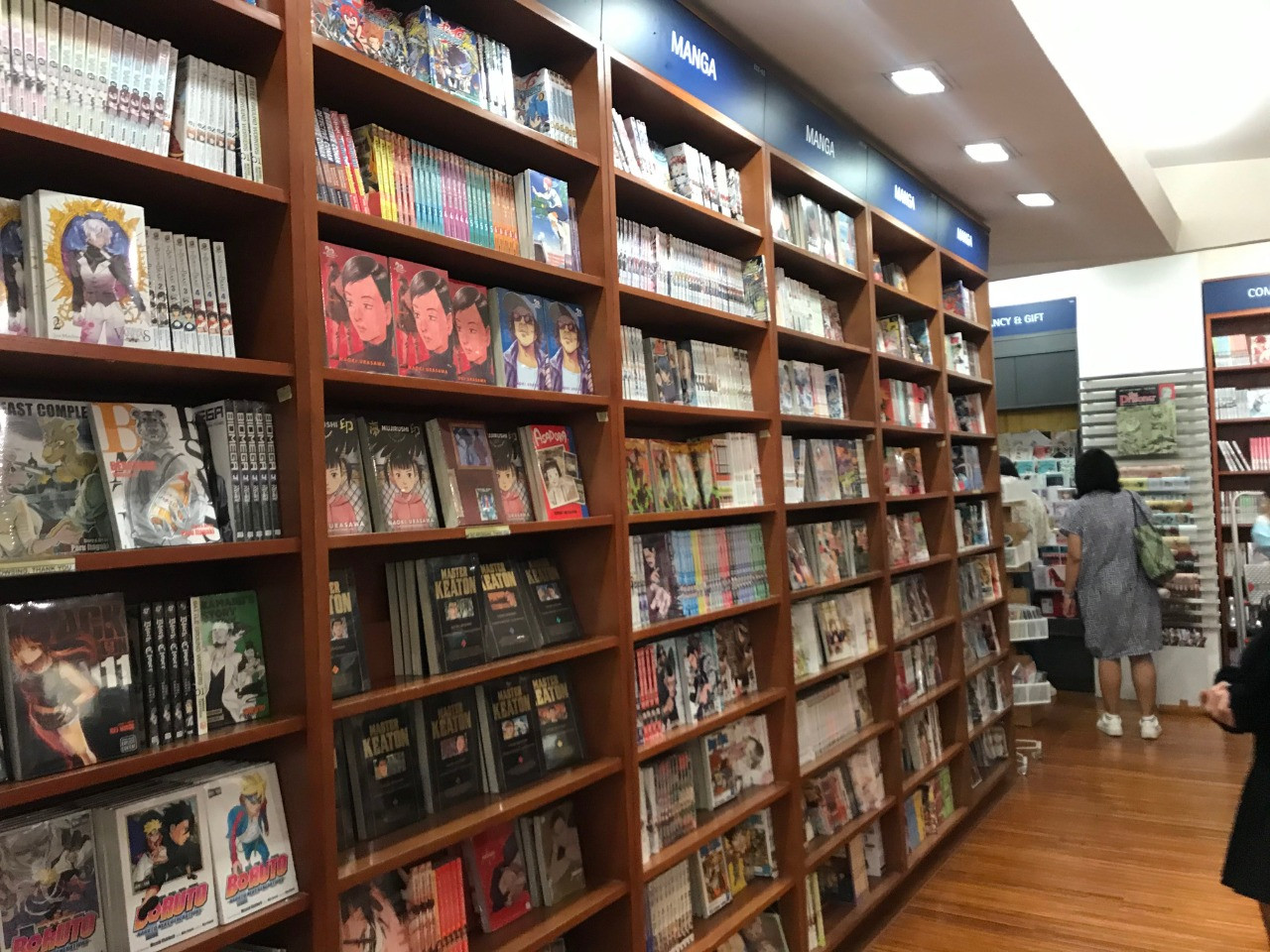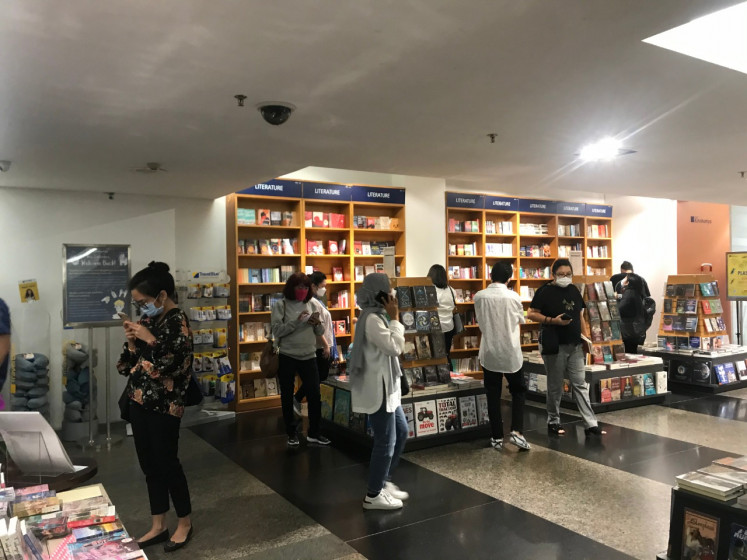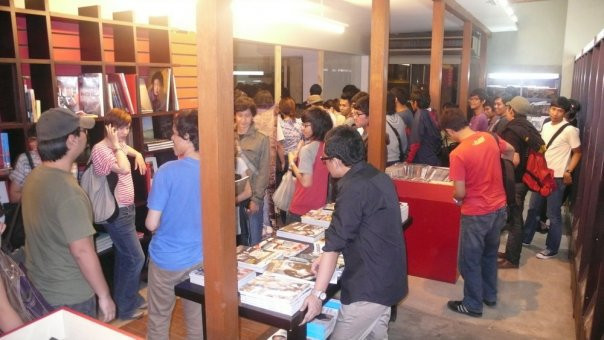Popular Reads
Top Results
Can't find what you're looking for?
View all search resultsPopular Reads
Top Results
Can't find what you're looking for?
View all search resultsAs Kinokuniya and more bookstores close down, book lovers pay tribute
Online bookstores are mushrooming while their physical counterparts are losing customers. As this process of bookstore digitization takes place, The Jakarta Post talks to bookstore owners and avid readers about what is lost and what is gained.
Change text size
Gift Premium Articles
to Anyone
B
etween the dwindling number of customers and the pandemic, many local bookstores have had to shut down, moving to an exclusively online business model. Notably, Aksara had to close down most of its branches before closing down its main store in Kemang, late last year.
Similarly, Kinokuniya in Jakarta’s Plaza Senayan closed down on March 31. Known for its large collection (mostly in English and Japanese), the bookstore was seen by many local book aficionados as one of the last major bookstores in existence in Jakarta. Some see its closing as the final nail in the coffin for dedicated, curated bookstores.
Sentimental value
Indeed, bookstores mean a lot to Indonesians. Ranaditya Alief, a 31-year-old podcaster, said Kinokuniya in particular played a huge part in shaping and maintaining his reading interest.
"In Kinokuniya, there was a huge emphasis on graphic novels. As someone who identified as otaku [people with a high interest in Japanese anime and manga], I felt represented over there. It gave me validation because it treats comic books and literature on the same plateau. So the impression I got is that one form of book preference isn't inferior to the other," he told the Post.
In the same vein, Tania Winanto, 28, also a Kinokuniya regular, said physical bookstores played a major role in her childhood.
"Back [when I was younger], we had no internet, so I usually roamed around the [Kinokuniya] bookshelves for hours reading synopses. So the feeling of finally finding a book that you were interested in after reading the back cover was there. And also the mystery of finding out whether or not you'd love the book, it's irreplaceable.”
Astrid Bestari, 24, told the Post about the role of bookstores in helping her “find [herself]”. "My fondest memories of bookstores are going to Aksara 4-5 times a week. For me, that place did not just shape who I am as a person right now—as it gave me my first encounter with art, culture and music—but it also gave me that feeling of being in a safe haven during my teenage years.” She continued to buy books for her two children there.
Astrid said she discovered an interest in fashion after discovering a book on the topic in Aksara. Now she is pursuing a career as a fashion writer.
Practicality wins
Some people form a bond with their go-to bookstores, but some choose practicality over sentimental memories. Online book shopping is simply more convenient and in some cases, more cost-effective.
"Online transactions are much more practical, easy and fast. Say, if we're looking for a book, it's just one search away. If we need to browse the bookshelves, it's going to take much longer," said Hilel, a 23-year-old content specialist and avid reader who has long used online bookstores. Online bookstores also offer a relatively lower price point. Like a lot of local readers, even after coming across a title she’s interested in at a bookstore, Hilel usually opts to purchase it online.
Book lovers browse Kinokuniya in Plaza Senayan on its last day at the end of March 2021. (JP/Vania Evan)Better accessibility for those in remote places is the next thing online bookstores have going for them. Open Trolley, a local online bookstore that mostly sells imported books, rose to quick prominence because it filled this gap in the market.
Open Trolley’s country manager Yenny told the Post that "from the start, we felt there was a demand for quality imported books from book buyers across Indonesia. Yet many book readers live far away from major cities and had little access to such books. This was the driving force behind the start of our store in 2012." Online bookstores transcend geographical constraints that make it easier for everyone—not just those bigger cities—to get hold of any titles they want.
Irreplacable experience
For many, there is an art in physical book browsing that cannot be replicated online.
"If you wander around bookstores online, most of the time, you buy things based on recommendations, by the algorithms. When you go to a bookstore, there's a sense of getting lost among all those books without being too curated. Yes, they have best-selling books stacked on a dedicated shelf, but we are still mostly in control of what to browse first," podcaster Ranaditya said.
Aksara director Adinda Simandjuntak shared the same sentiment, explaining that while offline bookstores were more costly to run, there was an irreplaceable energy offered by the overall offline experience that made everything worth it. "Even now, physical bookstores are still very important. Bookstores should be a sanctuary in [an] increasingly virtual world that has the potential to dehumanize [people]."
A crowd gathers for a music showcase held at Aksara Kemang, ca. 2010-2011. Due to the popularity of Aksara Kemang in the music community, the store would usually hold showcases. (ak.sa.ra/Facebook/Unknown (Aksara archive))After Aksara Kemang—the store’s first and main branch—closed down, it opened a smaller version within art gallery Dia.lo.gue’s premises. This shows Aksara's clear stance on how an offline presence is considered necessary even as they move their focus online. As of now, Aksara has been giving its best shot to enrich and elevate its online presence but it will always be a hybrid of online and offline, as Adinda stated.
"Sure, you can just click and pay for your books in no time, but the human factor and the tactile experience is the soul of a bookstore."













